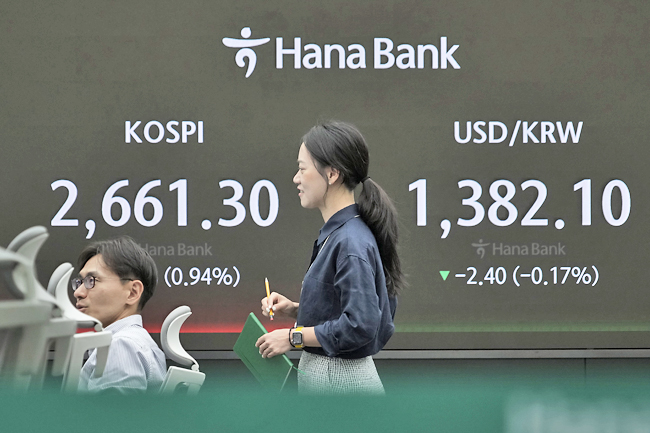AP – World shares began June mostly higher after a report showing that inflation in the United States (US)is not worsening drove a rally on Wall Street.
In early trading yesterday, Germany’s DAX advanced one per cent to 18,728.00 and the CAC 40 in Paris climbed 0.6 per cent to 8,040.94. Britain’s FTSE 100 added 0.4 per cent to 8,313.50.
The future for the S&P 500 was up 0.2 per cent while that for the Dow was virtually unchanged.
India’s Sensex surged 3.2 per cent to 76,304.58 after the country’s six-week-long national election came to an end with most exit polls projecting that Prime Minister Narendra Modi will extend his decade in power with a third consecutive term.
Hong Kong’s Hang Seng jumped 1.8 per cent to 18,403.04, while the Shanghai Composite index fell back in the afternoon, losing 0.3 per cent to 3,078.49.
Tokyo’s Nikkei 225 advanced 1.1 per cent to 38,933.36 and the Kospi in Seoul surged two per cent to 2,682.52.
Australia’s S&P/ASX 200 climbed 0.8 per cent to 7,761.00.
In Taiwan, the Taiex closed 1.8 per cent higher.

On Friday, the S&P 500 rose 0.8 per cent to close its sixth winning month in the last seven. The Dow leaped 1.5 per cent and the Nasdaq slipped less than 0.1 per cent.
Stocks broadly got a boost from easing Treasury yields in the bond market after the latest reading on inflation came in roughly as expected, at 2.7 per cent last month.
That could bolster confidence at the Federal Reserve (Fed) that inflation is sustainably heading toward its target of two per cent, something it said it needs before it will cut its main interest rate.
Friday’s report from the US government also showed growth in consumer spending weakened by more than economists expected. Growth in incomes for Americans also slowed last month.
“Finally, the US economic data is starting to show clear signs that consumers are feeling the pinch. With savings running dry, prices skyrocketing, the job market cooling down, disposable incomes taking a hit, and interest rates still high, spending in 2022 is becoming impossible. It’s like trying to fill a bucket with a hole in it – good luck keeping it full,” Stephen Innes of SPI Asset Management said in a commentary.
The Fed has been keeping the federal funds rate at the highest level in more than 20 years in hopes of slowing the economy enough to stifle high inflation. But if it holds rates too high for too long, it could choke off the economy’s growth and cause a recession that throws workers out of their jobs and craters profits for companies.
In other dealings early yesterday, US benchmark crude oil picked up 21 cents to USD77.20 per barrel in electronic trading on the New York Mercantile Exchange.
Brent crude, the international standard, rose eight cents to USD81.36 after OPEC agreed during the weekend to maintain its production cuts at a time when prices are slack.
The US dollar fell to JPY157.05 from JPY157.26. The euro slipped to USD1.0839 from USD1.0848.






